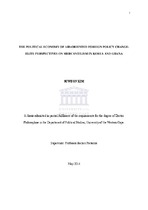| dc.description.abstract | The thesis examines how elite perspectives on foreign aid affect the subsequent path of aid dependence. The focus is on aid-seeking foreign policy change. Two foreign policy change cases are examined for the study, which took place in Korea under Park Chung-hee and in Ghana under Rawlings through a lens of comparative historical analysis. The thesis aims to make two original contributions to knowledge. First, it explains recipient foreign policy using two different forms of mercantilism, and second, it reveals the dependent path created by the mercantilist oriented elite.
Mercantilism in the thesis is used as dual-frameworked concept. First, it is a lens to see state behaviour. Despite the fact that mercantilism has been mainly used to explain a donor‘s behaviour, it can elucidate that of an aid-recipient state when the aid-seeking country is in dire need of the foreign aid for the survival of the state. The thesis applies mercantilism to explain aid-receiving countries‘behaviour. Second, more importantly, mercantilism also explains elite perspectives. The elite in aid receiving countries search for foreign aid not only for the wealth and power of their state, but also for the prosperity and survival of themselves. Mercantilism is used as an ostensible principle in practicing the private search for advantages of the elite. The thesis uses the dual-mercantilism idea to examine aid-seeking foreign policy in Korea and Ghana. In Korea, the elite saw the key to their survival in industrialising the nation, and their search for foreign aid took place based on that raison d’être. In Ghana, on the other hand, the elite found the way to their survival and prosperity in acquiring more foreign aid and the aid per se became the ultimate goal. The thesis finds industrial mercantilism a useful framework to understand the elite perspective in Korea | en_US |

